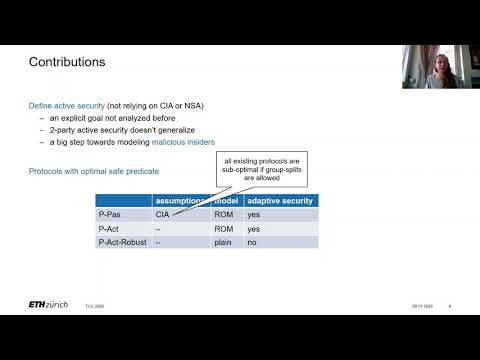CryptoDB
Continuous Group Key Agreement with Active Security
| Authors: | |
|---|---|
| Download: | |
| Abstract: | A continuous group key agreement (CGKA) protocol allows a long-lived group of parties to agree on a continuous stream of fresh secret key material. CGKA protocols allow parties to join and leave mid-session but may neither rely on special group managers, trusted third parties, nor on any assumptions about if, when, or for how long members are online. CGKA captures the core of an emerging generation of highly practical end-to-end secure group messaging (SGM) protocols. In light of their practical origins, past work on CGKA protocols have been subject to stringent engineering and efficiency constraints at the cost of diminished security properties. In this work, we somewhat relax those constraints, instead considering progressively more powerful adversaries. To that end, we present 3 new security notions of increasing strength. Already the weakest of the 3 (passive security) captures attacks to which all prior CGKA constructions are vulnerable. Moreover, the 2 stronger (active security) notions even allow the adversary to use parties' exposed states combined with full network control to mount attacks. In particular, this is closely related to so-called insider attacks which involve malicious group members actively deviating from the protocol. Although insiders are of explicit interest to practical CGKA/SGM designers, our understanding of this class of attackers is still quite nascent. Indeed, we believe ours to be the first security notions in the literature to precisely formulate meaningful guarantees against (a broad class of) insiders. For each of the 3 new security notions we give a new CGKA scheme enjoying sub-linear (potentially even logarithmic) communication complexity in the number of group members (on par with the asymptotics of state-of-the-art practical constructions). We prove each scheme optimally secure, in the sense that the only security violations possible are those necessarily implied by correctness. |
Video from TCC 2020
BibTeX
@article{tcc-2020-30613,
title={Continuous Group Key Agreement with Active Security},
booktitle={Theory of Cryptography},
publisher={Springer},
author={Joël Alwen and Sandro Coretti and Daniel Jost and Marta Mularczyk},
year=2020
}

